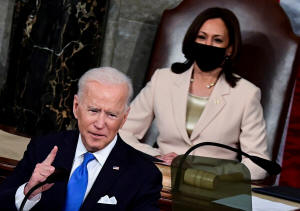Analysis-Biden poised to pivot U.S. arms deals toward security, human
rights
 Send a link to a friend
Send a link to a friend
 [May 05, 2021]
By Mike Stone [May 05, 2021]
By Mike Stone
WASHINGTON (Reuters) - Ninety minutes
before President Joe Biden took office on January 20th, the United
States signed a $23 billion dollar deal to sell F-35 jets, drones and
advanced missiles to the United Arab Emirates.
It was part of flurry of last minute deals President Donald Trump had
told Congress were coming in his last two months in office, forcing the
Biden administration to make quick decisions on whether or not to stick
with the geopolitically sensitive weapons sales.
To the surprise of some Democratic allies, Biden has so far kept the
lion's share of Trump's more controversial agreements. Executives at
five large defense contractors who requested anonymity to speak freely
were also surprised by the speed of the Biden administration's
deliberations.
Longer-term, however, those executives and five more people in and
around the administration told Reuters that Biden's policy will shift to
emphasize human rights over Trump's more commercial approach to
exporting military equipment.

Biden's posture towards arms exports - specifically around reducing
weapons used to attack others - could shift sales at Boeing Co, Raytheon
Technologies Corp and Lockheed Martin Corp. That means fewer bullets,
bombs and missiles, while security products like radars, surveillance
equipment and defenses against attacks get the green light.
In an interview last week, Raytheon's CFO Neil Mitchill said that
offensive munitions exports, "going forward, the kinds of sales that we
were talking about have been declining," adding there has been a
multi-year downward trend of offensive weapon sales to foreign
customers.
Boeing and Lockheed declined to comment.
In the early days of the Biden administration, officials paused weapons
sales to Middle East allies, including sales of Raytheon's and
Boeing-made precision guided munitions to Saudi Arabia.
Eventually a determination was made to only sell the Kingdom "defensive"
arms, while limiting weapons that could be used to attack out of concern
over casualties in Saudi Arabia's war with Yemen.
Biden's team ultimately decided to stick with the massive UAE deal. The
move spurred criticism from the human rights group Amnesty International
which immediately bashed the decision and drew complaints from lawmaker
Robert Menendez, Chairman of the powerful Senate Foreign Relations
Committee.
One former U.S. official familiar with the Biden transition team's
thinking noted that many aspects of the F-35 sale still need to be
negotiated, giving them leverage as the Abraham Accords between UAE and
Israel are implemented. The F-35 sale was a side deal to the accords.
[to top of second column]
|

President Joe Biden addresses a joint session of Congress as U.S.
Vice President Kamala Harris looks on at the U.S. Capitol in
Washington, U.S., April 28, 2021. Jim Watson/Pool via REUTERS

PIVOT TO DEFENSE
But arms deals like Trump's UAE agreement, and others with
governments that have poor records on human rights records look far
less likely from the Biden White House.
"While economic security will remain a factor" when reviewing
weapons sales, the Biden Administration will "reprioritize" other
factors including U.S. national security, human rights and
nonproliferation, a U.S. official has told Reuters.
"I'm hopeful that as we hear statements that support human rights as
being front and center in arms transfer deliberations, we'll see
that play out through actual decisions, and not just words," Rachel
Stohl, vice president at the Stimson Center in Washington said.
During the transition period from election day in November to
Biden's inauguration, Trump's team sent notification of $31 billion
of foreign arms sales to Congress. Congressional notifications occur
for most foreign military sales before a contract can be signed to
sell a weapon.
On average, foreign military sales under Trump amounted to $57.5
billion per year, versus an average of $53.9 billion per year for
the eight years under his predecessor Barack Obama, in 2020 dollars,
according to Bill Hartung, director of the Arms and Security Program
at the Center for International Policy think tank.
Biden's approval of several late-Trump deals will ease the political
and diplomatic transition from one administration to another,
according to a State Department official. In the case of the UAE
deal, the official said, it helps the two nations "meet our mutual
strategic objectives to build a stronger, interoperable, and more
capable security partnership."
As Lockheed's CEO Jim Taiclet put it to Reuters late last year,
"alliances are really important... Foreign Military Sales are part
and parcel of that."
The Biden administration inherited a backlog of more than 500
weapons export deals teed up by the Trump administration, one person
briefed on the State Department's backlog said.
Going forward, the Stimson Center's Rachel Stohl said Biden's State
Department team is "looking at countries, at individual weapons
systems, as well as individual sales." But as more appointees take
their posts at the State Department she said there could be a
"paradigm shift on the way in which arms sales are considered as
part of holistic efforts to develop and build partnerships and
capacity."
(Reporting by Mike Stone in Washington; editing by Chris Sanders and
Edward Tobin)
[© 2021 Thomson Reuters. All rights
reserved.] Copyright 2021 Reuters. All rights reserved. This material may not be published,
broadcast, rewritten or redistributed.
Thompson Reuters is solely responsible for this content. |